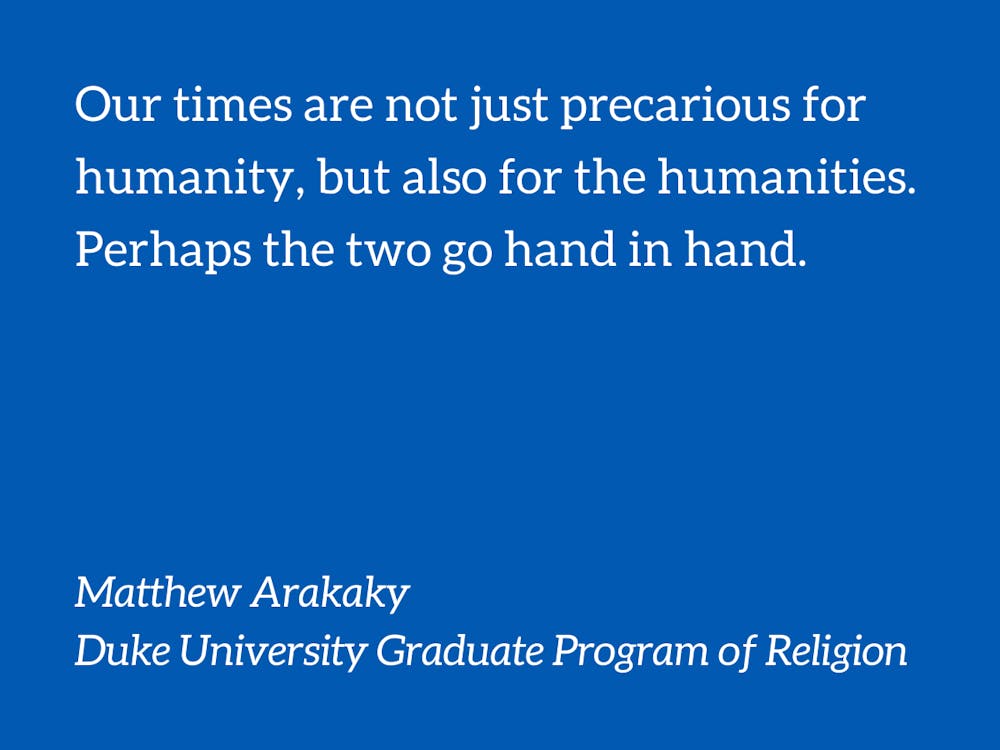As I write this, an emboldened Russia is mercilessly assaulting innocent Ukrainian civilians, slowly inching toward Kyiv.
Already, Russian forces have bombed a children’s hospital and have shelled a theater full of scared noncombatants. Thousands huddle together in the subways, fearing the dangers that lurk above. If anybody tries to escape, they do so at the risk of their own life—the image of a Russian tank crushing the car of an elderly man attempting to flee is unforgettable.
All this follows on the heels of a global pandemic that spanned over two years. In 2020, the world came to a screeching halt as a novel Coronavirus tore through the globe. In a matter of weeks, New York went from thousands cheerfully singing new year songs to a ghost town. The deafening silence of lockdown has now morphed into loud, fiery explosions as missiles rain down indiscriminately in Ukraine. The world is coming undone, tearing at the seams. As moderns living in the Post-World War II era, we are tempted to think the chaos plaguing our world is new—but history should give us pause.
Ancient Egyptians believed that chaos (isfet) and order (maat) lived in perpetual conflict with each other. The Pharaoh’s rule established order, but chaos always stalked in the shadows looking for the right moment to strike. If the Pharoah slacked in his duties, chaos would gain a foothold and wreak havoc. With the Hittites, Assyrians and Babylonians to the north and the Nubians to the south, Egypt’s security was always tentative. In many ways, the Egyptian worldview centered on the enduring threat of chaos. But Egypt wasn’t alone in facing the uncontrollable forces of the cosmos.
The ancient Near East was a brutal world filled with violence and death. Infant mortality rates approximated 50–60% and crop failure threatened the survival of entire civilizations. Death was a daily experience for these cultures; a reality that had to be confronted, not avoided.
Serbian archaeologist and Egyptologist, Branislav Andelković reminds us that the “barely visible ancient footprints of the human past do not lead down an abstract, long-gone, blind alley—they lead to human presence, to us.” Ancient literature invites modern readers to eavesdrop on voices of the human past, and to hear echoes of ourselves in the process. The study of ancient texts reveals humanity’s shared hopes, dreams and fears.
In the mythological literature of Ugarit—a late bronze age city in Syria-Palestine—the problem of mortality emerges as a key motif. In the Baal Myth, the god of death, Môtu, has an edacious appetite both for humans and other deities. Môtu even consumes the storm-god Baal, a divine warrior who had previously defeated Yammu, the god of the sea and chaos personified. In this myth, Death cannot be assuaged or defeated.
Toward the end of the myth, however, Baal’s sister Anat confronts Môtu and demands that he bring Baal back from the dead. The narrator describes Anat’s love for Baal as the force that drives her to seek her brother’s revival. After Môtu taunts Anat, the goddess casts off all restraint and violently slaughters him. Later, we learn that Anat’s intervention is successful in bringing Baal back from the dead. One theology of the Baal Cycle is that the goddess’s filial love brings about the death of Death. Love is the only force powerful enough to conquer death.
The ancient Ugaritians had to deal with the reality of death, and recent events have reminded us that we must do the same. Evil endures in our world, and we can no longer act as though evil is an illusion. For ancient Ugaritians, penning a mythological story about the triumph of love over death was their way of addressing this deeply humanistic concern. Literature has always provided a way for humans to cope with the tragic realities of our world. We, too, must find our way forward.
Jim Leach famously said that “the arts and humanities are vastly more important in troubled times.” The humanities directly confront the human condition and the problems that challenge us: Love, death, friendship, betrayal, excitement, disappointment, joy, depression. Without the humanities, we lose the opportunity to process the harsh realities of our world in a healthy way. Could the rise in mental illness be at least partly connected to our progressive rejection of asking existential questions, such as: what is the role of death and suffering in the cosmos?
Most faculty and students here at Duke belong to STEM fields. In fact, more and more, the natural sciences and related disciplines are squeezing the humanities out of the academy. Our times are not just precarious for humanity, but also for the humanities. Perhaps the two go hand in hand.
I do not wish to undermine the sciences. STEM and related disciplines contribute greatly to human flourishing and deserve a place in higher education. But to neglect the humanities would also be a grave mistake, especially in our days. In the humanities, we write and muse about those things that make us laugh, cry, sing and lament. The humanities remind us that we are a part of the human story. The sciences may help humans live longer, but the humanities remind us of what being human means in the first place.
My appeal is a modest one. Major in computer science, if that is your preference, but also probe the depths of ancient and modern literature and the arts as you do. You may find, as Geertz said, that “the perception of there being a deep gulf between science and the humanities is false.”
Matthew Arakaky is a doctoral candidate in the Graduate Program of Religion at Duke University, where he studies the religion and literature of the Hebrew Bible. He previously studied at the University of Virginia, Princeton Seminary, the University of Chicago and the Johns Hopkins University.
Get The Chronicle straight to your inbox
Sign up for our weekly newsletter. Cancel at any time.

